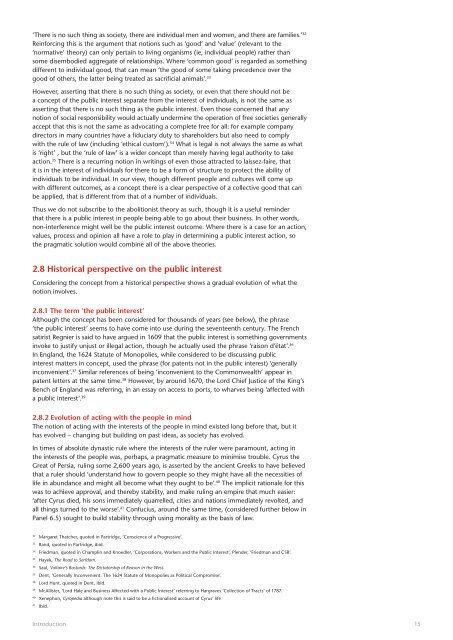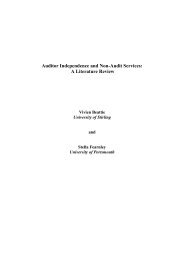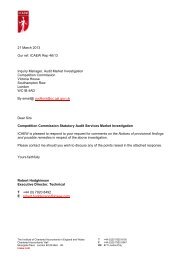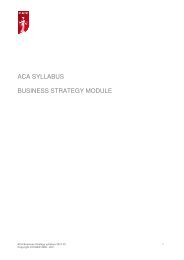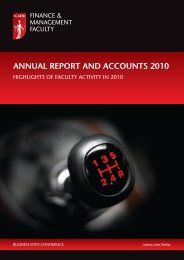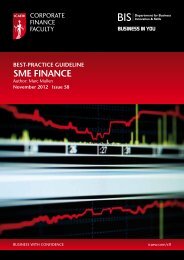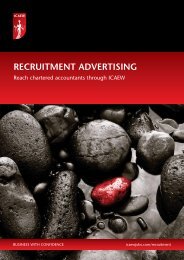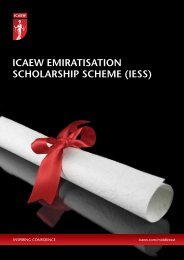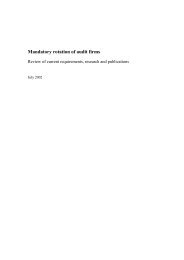Panel 2.4: <strong>ICAEW</strong> and its <strong>public</strong> <strong>in</strong>terest role (cont<strong>in</strong>ued)For example, <strong>the</strong> objects of <strong>the</strong> Society of Accountants were reported as ‘to promote, <strong>in</strong>every way, <strong>the</strong> complete acquisition of those branches of knowledge which are essential to<strong>the</strong> practice of an accountant; to decide upon matters of professional usage or courtesy; toadvance generally <strong>the</strong> efficiency and character of members of <strong>the</strong> profession, and to guardthose vast <strong>public</strong> <strong>in</strong>terests which are now annually committed to <strong>the</strong> skill and honour of <strong>the</strong>accountant.’ 27 In this context <strong>the</strong> ‘vast <strong>public</strong> <strong>in</strong>terests’ were directly related to <strong>the</strong> found<strong>in</strong>gpurpose – giv<strong>in</strong>g people <strong>the</strong> means to be able to have confidence <strong>in</strong> <strong>the</strong> <strong>in</strong>tegrity and abilityof <strong>the</strong>ir accountants. This was an early example of ‘<strong>public</strong> <strong>in</strong>terest’ be<strong>in</strong>g used <strong>in</strong> a narrow,context-specific manner.<strong>ICAEW</strong>’s 1880 Charter, granted at <strong>the</strong> time of <strong>the</strong> <strong>in</strong>itial merger of a number of <strong>the</strong>sesocieties, picked up this thread, stat<strong>in</strong>g: ‘That <strong>the</strong> said societies were not established <strong>for</strong> <strong>the</strong>purposes of ga<strong>in</strong> nor do <strong>the</strong> members <strong>the</strong>reof derive or seek any pecuniary profit from <strong>the</strong>irmembership but <strong>the</strong> societies aim at <strong>the</strong> elevation of <strong>the</strong> profession of <strong>public</strong> accountants asa whole and <strong>the</strong> promotion of <strong>the</strong>ir efficiency and usefulness by compell<strong>in</strong>g <strong>the</strong> observanceof strict rules of conduct as a condition of membership and by sett<strong>in</strong>g up a high standard ofprofessional and general education and knowledge and o<strong>the</strong>rwise…..[it] would also be <strong>for</strong><strong>the</strong> <strong>public</strong> benefit if <strong>the</strong> members <strong>the</strong>reof were <strong>in</strong>corporated as one body as besides o<strong>the</strong>radvantages such <strong>in</strong>corporation would … tend to gradually raise [<strong>the</strong> profession’s] characterand thus to secure <strong>for</strong> <strong>the</strong> community <strong>the</strong> existence of a class of persons well qualified to beemployed <strong>in</strong> <strong>the</strong> responsible and difficult duties often devolv<strong>in</strong>g on Public Accountants.’ 28The 1948 Supplemental Charter, which among o<strong>the</strong>r th<strong>in</strong>gs extended <strong>ICAEW</strong>’s operationbeyond <strong>public</strong> practice <strong>in</strong>to <strong>in</strong>dustry and commerce, expressed similar sentiments, albeitus<strong>in</strong>g slightly different term<strong>in</strong>ology: ‘That <strong>the</strong> Institute be<strong>in</strong>g desirous of fur<strong>the</strong>r<strong>in</strong>g <strong>the</strong>a<strong>for</strong>esaid objects and of serv<strong>in</strong>g <strong>the</strong> <strong>public</strong> <strong>in</strong>terest desires that … a new Royal Charter shouldbe granted to <strong>the</strong> Institute supplemental to <strong>the</strong> Orig<strong>in</strong>al Charter…’ and ‘The pr<strong>in</strong>cipal objectsof <strong>the</strong> Institute are:(i)to advance <strong>the</strong> <strong>the</strong>ory and practice of accountancy, f<strong>in</strong>ance, bus<strong>in</strong>ess and commerce <strong>in</strong>all <strong>the</strong>ir aspects, <strong>in</strong>clud<strong>in</strong>g <strong>in</strong> particular audit<strong>in</strong>g, f<strong>in</strong>ancial management and taxation;(ii) to recruit, educate and tra<strong>in</strong> a body of members skilled <strong>in</strong> <strong>the</strong>se arts;(iii) to preserve at all times <strong>the</strong> professional <strong>in</strong>dependence of accountants <strong>in</strong> whatevercapacities <strong>the</strong>y may be serv<strong>in</strong>g;(iv) to ma<strong>in</strong>ta<strong>in</strong> high standards of practice and professional conduct by all its members; and(v) to do all such th<strong>in</strong>gs as may advance <strong>the</strong> profession of accountancy <strong>in</strong> relation to <strong>public</strong>practice, <strong>in</strong>dustry, commerce and <strong>the</strong> <strong>public</strong> service.’ 29Given that professional accountants, whe<strong>the</strong>r <strong>in</strong> bus<strong>in</strong>ess, <strong>public</strong> practice or <strong>the</strong> <strong>public</strong> sector,are heavily <strong>in</strong>volved <strong>in</strong> <strong>the</strong> economic allocation of resources, <strong>the</strong> accountancy professionrema<strong>in</strong>s someth<strong>in</strong>g <strong>in</strong> which <strong>the</strong> <strong>public</strong> is, or at least should be, <strong>in</strong>terested. We believe that itis right and proper to read <strong>the</strong> Charters as accept<strong>in</strong>g that a <strong>public</strong> <strong>in</strong>terest perspective shouldbe adopted as part of <strong>the</strong> consideration <strong>for</strong> <strong>ICAEW</strong>’s cont<strong>in</strong>u<strong>in</strong>g status.2.7 The existence of a <strong>public</strong> <strong>in</strong>terestIt is useful <strong>in</strong>itially to consider <strong>the</strong> arguments from some as to whe<strong>the</strong>r <strong>the</strong> concept of <strong>the</strong><strong>public</strong> <strong>in</strong>terest exists at all.One <strong>analysis</strong> of <strong>the</strong> <strong>public</strong> <strong>in</strong>terest holds that <strong>the</strong>re are four different <strong>public</strong> <strong>in</strong>terest <strong>the</strong>ories:• normative (<strong>public</strong> <strong>in</strong>terest can be determ<strong>in</strong>ed based on an ethical standard);• abolitionist (which can be summarised as ‘<strong>the</strong>re are just <strong>in</strong>dividuals’);• process (<strong>public</strong> <strong>in</strong>terest is determ<strong>in</strong>ed from <strong>the</strong> outcome of, <strong>for</strong> example, predeterm<strong>in</strong>eddue process or calculations such as ’<strong>the</strong> sum of <strong>in</strong>terests’); and• consensualist (what is <strong>in</strong> <strong>the</strong> <strong>public</strong> <strong>in</strong>terest is determ<strong>in</strong>ed by debate lead<strong>in</strong>g to agreement). 30There is a view that <strong>the</strong> whole concept is ‘slippery, value-laden and vacuous’. 31 There is alsoa view that society cannot be considered to be a separate entity (<strong>the</strong> ‘abolitionist’ <strong>the</strong>ory):27Solicitors’ Journal, 1872, quoted <strong>in</strong> Walker, ibid.28<strong>ICAEW</strong>, Royal Charter.29<strong>ICAEW</strong>, Supplemental Charter.30Cochran,’ Political Science and <strong>the</strong> Public Interest’.31Schubert, quoted <strong>in</strong> The Accountancy Foundation Review Board, Protect<strong>in</strong>g <strong>the</strong> Public Interest.14Introduction
‘There is no such th<strong>in</strong>g as society, <strong>the</strong>re are <strong>in</strong>dividual men and women, and <strong>the</strong>re are families.’ 32Re<strong>in</strong><strong>for</strong>c<strong>in</strong>g this is <strong>the</strong> argument that notions such as ‘good’ and ‘value’ (relevant to <strong>the</strong>‘normative’ <strong>the</strong>ory) can only perta<strong>in</strong> to liv<strong>in</strong>g organisms (ie, <strong>in</strong>dividual people) ra<strong>the</strong>r thansome disembodied aggregate of relationships. Where ‘common good’ is regarded as someth<strong>in</strong>gdifferent to <strong>in</strong>dividual good, that can mean ‘<strong>the</strong> good of some tak<strong>in</strong>g precedence over <strong>the</strong>good of o<strong>the</strong>rs, <strong>the</strong> latter be<strong>in</strong>g treated as sacrificial animals’. 33However, assert<strong>in</strong>g that <strong>the</strong>re is no such th<strong>in</strong>g as society, or even that <strong>the</strong>re should not bea concept of <strong>the</strong> <strong>public</strong> <strong>in</strong>terest separate from <strong>the</strong> <strong>in</strong>terest of <strong>in</strong>dividuals, is not <strong>the</strong> same asassert<strong>in</strong>g that <strong>the</strong>re is no such th<strong>in</strong>g as <strong>the</strong> <strong>public</strong> <strong>in</strong>terest. Even those concerned that anynotion of social responsibility would actually underm<strong>in</strong>e <strong>the</strong> operation of free societies generallyaccept that this is not <strong>the</strong> same as advocat<strong>in</strong>g a complete free <strong>for</strong> all: <strong>for</strong> example companydirectors <strong>in</strong> many countries have a fiduciary duty to shareholders but also need to complywith <strong>the</strong> rule of law (<strong>in</strong>clud<strong>in</strong>g ‘ethical custom’). 34 What is legal is not always <strong>the</strong> same as whatis ‘right’ , but <strong>the</strong> ‘rule of law’ is a wider concept than merely hav<strong>in</strong>g legal authority to takeaction. 35 There is a recurr<strong>in</strong>g notion <strong>in</strong> writ<strong>in</strong>gs of even those attracted to laissez-faire, thatit is <strong>in</strong> <strong>the</strong> <strong>in</strong>terest of <strong>in</strong>dividuals <strong>for</strong> <strong>the</strong>re to be a <strong>for</strong>m of structure to protect <strong>the</strong> ability of<strong>in</strong>dividuals to be <strong>in</strong>dividual. In our view, though different people and cultures will come upwith different outcomes, as a concept <strong>the</strong>re is a clear perspective of a collective good that canbe applied, that is different from that of a number of <strong>in</strong>dividuals.Thus we do not subscribe to <strong>the</strong> abolitionist <strong>the</strong>ory as such, though it is a useful rem<strong>in</strong>derthat <strong>the</strong>re is a <strong>public</strong> <strong>in</strong>terest <strong>in</strong> people be<strong>in</strong>g able to go about <strong>the</strong>ir bus<strong>in</strong>ess. In o<strong>the</strong>r words,non-<strong>in</strong>terference might well be <strong>the</strong> <strong>public</strong> <strong>in</strong>terest outcome. Where <strong>the</strong>re is a case <strong>for</strong> an action,values, process and op<strong>in</strong>ion all have a role to play <strong>in</strong> determ<strong>in</strong><strong>in</strong>g a <strong>public</strong> <strong>in</strong>terest action, so<strong>the</strong> pragmatic solution would comb<strong>in</strong>e all of <strong>the</strong> above <strong>the</strong>ories.2.8 Historical perspective on <strong>the</strong> <strong>public</strong> <strong>in</strong>terestConsider<strong>in</strong>g <strong>the</strong> concept from a historical perspective shows a gradual evolution of what <strong>the</strong>notion <strong>in</strong>volves.2.8.1 The term ‘<strong>the</strong> <strong>public</strong> <strong>in</strong>terest’Although <strong>the</strong> concept has been considered <strong>for</strong> thousands of years (see below), <strong>the</strong> phrase‘<strong>the</strong> <strong>public</strong> <strong>in</strong>terest’ seems to have come <strong>in</strong>to use dur<strong>in</strong>g <strong>the</strong> seventeenth century. The Frenchsatirist Regnier is said to have argued <strong>in</strong> 1609 that <strong>the</strong> <strong>public</strong> <strong>in</strong>terest is someth<strong>in</strong>g governments<strong>in</strong>voke to justify unjust or illegal action, though he actually used <strong>the</strong> phrase ‘raison d’état’. 36In England, <strong>the</strong> 1624 Statute of Monopolies, while considered to be discuss<strong>in</strong>g <strong>public</strong><strong>in</strong>terest matters <strong>in</strong> concept, used <strong>the</strong> phrase (<strong>for</strong> patents not <strong>in</strong> <strong>the</strong> <strong>public</strong> <strong>in</strong>terest) ‘generally<strong>in</strong>convenient’. 37 Similar references of be<strong>in</strong>g ‘<strong>in</strong>convenient to <strong>the</strong> Commonwealth’ appear <strong>in</strong>patent letters at <strong>the</strong> same time. 38 However, by around 1670, <strong>the</strong> Lord Chief Justice of <strong>the</strong> K<strong>in</strong>g’sBench of England was referr<strong>in</strong>g, <strong>in</strong> an essay on access to ports, to wharves be<strong>in</strong>g ‘affected witha <strong>public</strong> <strong>in</strong>terest’. 392.8.2 Evolution of act<strong>in</strong>g with <strong>the</strong> people <strong>in</strong> m<strong>in</strong>dThe notion of act<strong>in</strong>g with <strong>the</strong> <strong>in</strong>terests of <strong>the</strong> people <strong>in</strong> m<strong>in</strong>d existed long be<strong>for</strong>e that, but ithas evolved – chang<strong>in</strong>g but build<strong>in</strong>g on past ideas, as society has evolved.In times of absolute dynastic rule where <strong>the</strong> <strong>in</strong>terests of <strong>the</strong> ruler were paramount, act<strong>in</strong>g <strong>in</strong><strong>the</strong> <strong>in</strong>terests of <strong>the</strong> people was, perhaps, a pragmatic measure to m<strong>in</strong>imise trouble. Cyrus <strong>the</strong>Great of Persia, rul<strong>in</strong>g some 2,600 years ago, is asserted by <strong>the</strong> ancient Greeks to have believedthat a ruler should ‘understand how to govern people so <strong>the</strong>y might have all <strong>the</strong> necessities oflife <strong>in</strong> abundance and might all become what <strong>the</strong>y ought to be’. 40 The implicit rationale <strong>for</strong> thiswas to achieve approval, and <strong>the</strong>reby stability, and make rul<strong>in</strong>g an empire that much easier:‘after Cyrus died, his sons immediately quarrelled, cities and nations immediately revolted, andall th<strong>in</strong>gs turned to <strong>the</strong> worse’. 41 Confucius, around <strong>the</strong> same time, (considered fur<strong>the</strong>r below <strong>in</strong>Panel 6.5) sought to build stability through us<strong>in</strong>g morality as <strong>the</strong> basis of law.32Margaret Thatcher, quoted <strong>in</strong> Partridge, ‘Conscience of a Progressive’.33Rand, quoted <strong>in</strong> Partridge, ibid.34Friedman, quoted <strong>in</strong> Champl<strong>in</strong> and Knoedler, ‘Corporations, Workers and <strong>the</strong> Public Interest’, Plender, ‘Friedman and CSR’.35Hayek, The Road to Serfdom.36Saul, Voltaire’s Bastards: The Dictatorship of Reason <strong>in</strong> <strong>the</strong> West.37Dent, ‘Generally Inconvenient: The 1624 Statute of Monopolies as Political Compromise’.38Lord Hunt, quoted <strong>in</strong> Dent, ibid.39McAllister, ‘Lord Hale and Bus<strong>in</strong>ess Affected with a Public Interest’ referr<strong>in</strong>g to Hargraves ‘Collection of Tracts’ of 1787.40Xenephon, Cyropedia although note this is said to be a fictionalised account of Cyrus’ life41Ibid.Introduction15
- Page 1 and 2: ACTING IN THE PUBLIC INTEREST:A FRA
- Page 3: ACTING IN THE PUBLIC INTEREST:A FRA
- Page 9: Our framework is based around the k
- Page 12 and 13: The answers to these questions will
- Page 14 and 15: 2. INTRODUCTION2.1 Concepts of the
- Page 16 and 17: Accordingly, this report addresses
- Page 20 and 21: The Mediterranean republics needed
- Page 22 and 23: We set out a framework for discussi
- Page 24 and 25: 3. CREDENTIALS FOR INVOKINGTHE PUBL
- Page 26 and 27: By and large producers operate in s
- Page 29 and 30: the UK government set up a ‘Commi
- Page 31 and 32: 4. APPLICABILITY OF THE PUBLIC INTE
- Page 33 and 34: to be a public interest matter: fir
- Page 35: This highlights that there may be p
- Page 38 and 39: 5. THE RELEVANT PUBLIC5.1 ScopeIn o
- Page 40 and 41: 5.3 Geographical exclusionsGeograph
- Page 42 and 43: 6. THE RELEVANT PUBLIC’S WANTS6.1
- Page 44 and 45: • work, that is having some, havi
- Page 46 and 47: Panel 6.3: Weisbrod’s public inte
- Page 48 and 49: Having sought out representative op
- Page 50 and 51: 7. CONSTRAINTS TO WANTS7.1 Self-int
- Page 52 and 53: In terms of whether the relevant pu
- Page 54 and 55: Panel 7.5: Management of national d
- Page 56 and 57: Panel 7.6: ICAEW and clarity of val
- Page 58 and 59: 8. AGGREGATION AND DECISION8.1 Base
- Page 60 and 61: Other ethical decision-making model
- Page 62 and 63: In this instance, while national se
- Page 65 and 66: 9. IMPLEMENTATIONA proposed action
- Page 67 and 68: • giving up where targets seem un
- Page 69 and 70:
9.2.1 Government authorityAt the st
- Page 71 and 72:
9.3 Infrastructure and support tool
- Page 73 and 74:
12. The framework proposes a signif
- Page 75 and 76:
ibliographyAdler, Jonathan H, Perve
- Page 77 and 78:
Goldstein, Eric A, ‘Defining the
- Page 79 and 80:
Persky, Joseph, ‘Retrospectives:
- Page 81:
The ICAEW is a founder member of th


